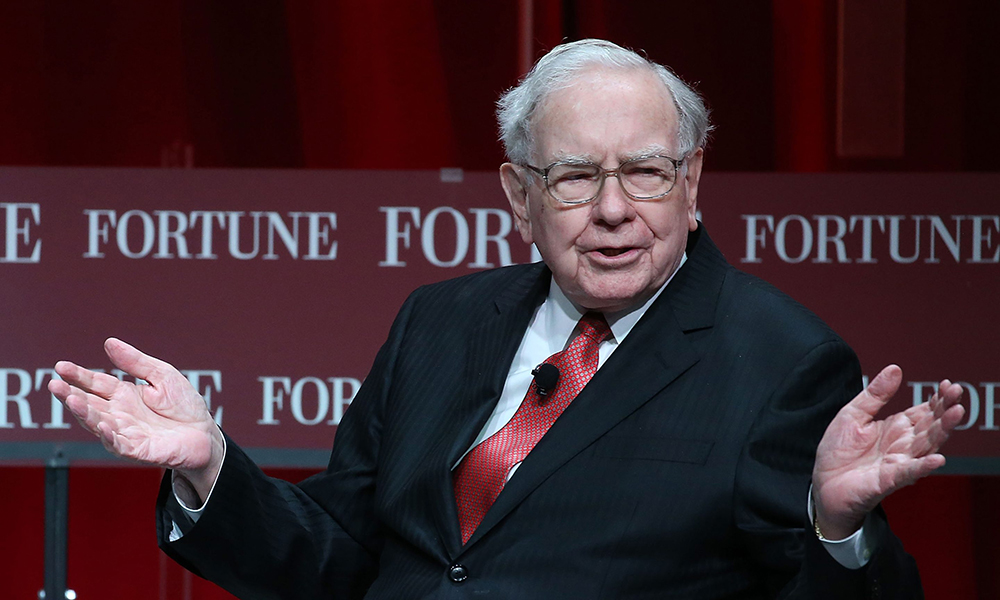
在有些人看來,伯克希爾-哈撒韋(Berkshire Hathaway Inc.)減持蘋果公司(Apple Inc.)的股份,可以解釋為該公司對iPhone手機生產商的增長故事缺乏信心。但許多華爾街人士呼吁投資者不要理會這則消息,并保持冷靜。
沃倫·巴菲特領導的龐然大物伯克希爾-哈撒韋上周六披露,其在第二季度出售了在科技巨頭蘋果的近半持股。目前其持股的價值約為840億美元,遠低于3月底的約1,400億美元。此次減持正值美股的一波火爆行情,使蘋果股價上漲了23%,標普500指數屢創新高。
自2016年沃倫·巴菲特首次披露其在蘋果的持股以來,蘋果股價暴漲約900%,鞏固了其在業內的主導地位,同時為沃倫·巴菲特創造了價值數十億美元的未實現利潤。
Integrity Asset Management的高級投資組合經理喬·吉爾伯特表示:“巴菲特減持蘋果股份只是為了管理風險。如果巴菲特對評估的長期可行性有任何顧慮,他可以直接清倉。與巴菲特其他減持操作類似,巴菲特在蘋果公司有大量未實現收益。”
就在伯克希爾公布其投資組合的幾天前,蘋果公司幾天前剛剛發布了季度業績。蘋果的業績報告顯示,公司恢復了收入增長,并暗示未來幾個季度新人工智能功能將刺激iPhone手機的銷量。營收報告公布后,盡管市場上出現整體拋售,但蘋果股價穩定,最終在上周結束時上漲。
巴菲特一直被譽為“奧馬哈先知”。雖然他的投資策略確實不容忽視,但近幾年,伯克希爾在蘋果的持股規模龐大,因此一些投資者開始猜測伯克希爾是否應該通過減持來平衡持股。即使在減持之后,蘋果依舊是伯克希爾規模最大的單一持股。
美國財務研究分析中心(CFRA)的研究分析師凱西·塞弗特表示:“當你的持倉規模過大時,你可以兌現一部分利潤,并減少集中風險。”她補充說:“伯克希爾-哈撒韋的投資組合依舊相當集中。”
這也并非伯克希爾首次減持蘋果股份。在5月召開的年度會議上,該公司公布在今年第一季度已經進行過減持。當時,巴菲特向投資者暗示,稅務影響可能是此次減持的決定因素之一。
蘋果和伯克希爾-哈撒韋的代表均未回應在周日正常工作時間以外發出的置評請求。
在最新的公告發布之際,人們普遍擔心美國可能即將陷入經濟衰退。上周五公布的就業數據不及預期,引發了人們對美聯儲降息可能已經等待太久的擔憂,使納斯達克100指數進入了技術性回調,芝加哥期權交易所波動率指數(Cboe Volatility Index)接近25。
微軟(Microsoft Corp.)、亞馬遜(Amazon.com Inc.)和Alphabet等其他大盤股均低于7月初的歷史最高水平。同期納斯達克100成分股的市值共縮水超過3萬億美元,英偉達(Nvidia Corp.)和特斯拉(Tesla Inc.)的市值縮水超過了20%。而蘋果公司的市值較歷史最高點下降了約6%。
扎克投資管理公司(Zacks Investment Management)的客戶組合經理布萊恩·馬爾伯里認為,伯克希爾與越來越多投資者一樣,希望看到更多證據,證明蘋果的人工智能投資能夠帶來收入增長,并且他們認為人工智能投資帶來回報的速度不夠快。
彭博社匯總的數據顯示,截至7月中旬,蘋果公司的估值倍數為未來利潤的33倍,比標普500指數高出11點,上一次出現這種差異還是在新冠疫情和金融危機之后。盡管蘋果的估值較高,但馬爾伯里認為,投資者持有蘋果股份依舊是明智的選擇。他表示:“蘋果公司的資產負債表狀況依舊健康,而且其收益增長速度仍將快于市場整體增長速度。”
包括維德布什(Wedbush)分析師丹·埃弗斯在內的其他人提到了蘋果公司的品牌忠誠度和未來增長。他認為蘋果即將迎來一次重要的升級周期,將在2025年和2026年推動收入增長。
埃弗斯表示:“雖然有人可能將巴菲特減持解讀為對信心的擔憂,但蘋果剛剛交出了一份強勁的季度業績,并且即將進入一個由人工智能驅動的超級周期,我們并不認為現在是退出的恰當時機。”
當然,蘋果并非伯克希爾最近減持的唯一一支股票。自7月中旬以來,該公司將美國銀行的股份減持8.8%。有人認為,這表明巴菲特并不認為這兩家公司存在任何問題,而是押注美國消費者和整體經濟即將陷入疲軟。
Clearstead Advisors公司的高級董事總經理吉姆·阿瓦德表示:“巴菲特可能感覺美國經濟即將陷入衰退,因此現在籌集現金,未來可以以較低的價格進行收購。或許他嗅到了未來的商機。”(財富中文網)
譯者:劉進龍
審校:汪皓
在有些人看來,伯克希爾-哈撒韋(Berkshire Hathaway Inc.)減持蘋果公司(Apple Inc.)的股份,可以解釋為該公司對iPhone手機生產商的增長故事缺乏信心。但許多華爾街人士呼吁投資者不要理會這則消息,并保持冷靜。
沃倫·巴菲特領導的龐然大物伯克希爾-哈撒韋上周六披露,其在第二季度出售了在科技巨頭蘋果的近半持股。目前其持股的價值約為840億美元,遠低于3月底的約1,400億美元。此次減持正值美股的一波火爆行情,使蘋果股價上漲了23%,標普500指數屢創新高。
自2016年沃倫·巴菲特首次披露其在蘋果的持股以來,蘋果股價暴漲約900%,鞏固了其在業內的主導地位,同時為沃倫·巴菲特創造了價值數十億美元的未實現利潤。
Integrity Asset Management的高級投資組合經理喬·吉爾伯特表示:“巴菲特減持蘋果股份只是為了管理風險。如果巴菲特對評估的長期可行性有任何顧慮,他可以直接清倉。與巴菲特其他減持操作類似,巴菲特在蘋果公司有大量未實現收益。”
就在伯克希爾公布其投資組合的幾天前,蘋果公司幾天前剛剛發布了季度業績。蘋果的業績報告顯示,公司恢復了收入增長,并暗示未來幾個季度新人工智能功能將刺激iPhone手機的銷量。營收報告公布后,盡管市場上出現整體拋售,但蘋果股價穩定,最終在上周結束時上漲。
巴菲特一直被譽為“奧馬哈先知”。雖然他的投資策略確實不容忽視,但近幾年,伯克希爾在蘋果的持股規模龐大,因此一些投資者開始猜測伯克希爾是否應該通過減持來平衡持股。即使在減持之后,蘋果依舊是伯克希爾規模最大的單一持股。
美國財務研究分析中心(CFRA)的研究分析師凱西·塞弗特表示:“當你的持倉規模過大時,你可以兌現一部分利潤,并減少集中風險。”她補充說:“伯克希爾-哈撒韋的投資組合依舊相當集中。”
這也并非伯克希爾首次減持蘋果股份。在5月召開的年度會議上,該公司公布在今年第一季度已經進行過減持。當時,巴菲特向投資者暗示,稅務影響可能是此次減持的決定因素之一。
蘋果和伯克希爾-哈撒韋的代表均未回應在周日正常工作時間以外發出的置評請求。
在最新的公告發布之際,人們普遍擔心美國可能即將陷入經濟衰退。上周五公布的就業數據不及預期,引發了人們對美聯儲降息可能已經等待太久的擔憂,使納斯達克100指數進入了技術性回調,芝加哥期權交易所波動率指數(Cboe Volatility Index)接近25。
微軟(Microsoft Corp.)、亞馬遜(Amazon.com Inc.)和Alphabet等其他大盤股均低于7月初的歷史最高水平。同期納斯達克100成分股的市值共縮水超過3萬億美元,英偉達(Nvidia Corp.)和特斯拉(Tesla Inc.)的市值縮水超過了20%。而蘋果公司的市值較歷史最高點下降了約6%。
扎克投資管理公司(Zacks Investment Management)的客戶組合經理布萊恩·馬爾伯里認為,伯克希爾與越來越多投資者一樣,希望看到更多證據,證明蘋果的人工智能投資能夠帶來收入增長,并且他們認為人工智能投資帶來回報的速度不夠快。
彭博社匯總的數據顯示,截至7月中旬,蘋果公司的估值倍數為未來利潤的33倍,比標普500指數高出11點,上一次出現這種差異還是在新冠疫情和金融危機之后。盡管蘋果的估值較高,但馬爾伯里認為,投資者持有蘋果股份依舊是明智的選擇。他表示:“蘋果公司的資產負債表狀況依舊健康,而且其收益增長速度仍將快于市場整體增長速度。”
包括維德布什(Wedbush)分析師丹·埃弗斯在內的其他人提到了蘋果公司的品牌忠誠度和未來增長。他認為蘋果即將迎來一次重要的升級周期,將在2025年和2026年推動收入增長。
埃弗斯表示:“雖然有人可能將巴菲特減持解讀為對信心的擔憂,但蘋果剛剛交出了一份強勁的季度業績,并且即將進入一個由人工智能驅動的超級周期,我們并不認為現在是退出的恰當時機。”
當然,蘋果并非伯克希爾最近減持的唯一一支股票。自7月中旬以來,該公司將美國銀行的股份減持8.8%。有人認為,這表明巴菲特并不認為這兩家公司存在任何問題,而是押注美國消費者和整體經濟即將陷入疲軟。
Clearstead Advisors公司的高級董事總經理吉姆·阿瓦德表示:“巴菲特可能感覺美國經濟即將陷入衰退,因此現在籌集現金,未來可以以較低的價格進行收購。或許他嗅到了未來的商機。”(財富中文網)
譯者:劉進龍
審校:汪皓
To some, Berkshire Hathaway Inc.’s gutting of its Apple Inc. stake could be interpreted as a lack of conviction in the iPhone maker’s growth story. But many on Wall Street are urging investors to look past the news and stay calm.
The Warren Buffett-led conglomerate revealed Saturday that it sold almost half of its position in the tech giant during the second quarter. Its stake now stands at roughly $84 billion, down from about $140 billion at the end of March. The selling took place during a torrid run in the stock market that sent Apple shares 23% higher and pushed the S&P 500 from one record to the next.
Since 2016, when Warren Buffett first disclosed its stake in Apple, its shares have soared almost 900% as the company cemented its grip on the industry, delivering Berkshire billions of dollars worth of unrealized profits along the way.
“Buffett’s reduction of his Apple stake is merely about risk management,” said Joe Gilbert, senior portfolio manager at Integrity Asset Management. “If there were any concerns about the longer-term viability of Apple, Buffett would have exited the entire position. Similar to Berkshire’s other stock position reductions, Buffett has meaningful unrealized gains.”
Berkshire’s portfolio reveal comes just days after Apple released its own quarterly results, which showed a return to revenue growth and signaled that new AI features will boost iPhone sales in the coming quarters. Apple shares were steady after the earnings report and ultimately ended the week higher despite the broader selloff.
While the investment strategy of Buffett — long known as the Oracle of Omaha — is hard to ignore, Berkshire’s stake in Apple had gotten so large in recent years that some investors had begun to wonder whether the firm would have to trim its position to balance out its holdings. Even after the unwind, Apple remains Berkshire’s largest single position.
“If you’ve got this outsized position you take some profits and you reduce some of your concentration risk,” said Cathy Seifert, a research analyst at CFRA. “They still have a fairly concentrated portfolio,” she added.
It’s also not the first time Berkshire has cut its stake in Apple. At its annual meeting in May, the firm revealed that it had reduced its position during the first quarter of the year. At the time, Buffett hinted to investors that tax implications may have played a role in the sale.
Representatives for Apple and Berkshire Hathaway didn’t respond to requests for comment outside of regular business hours on Sunday.
The latest announcement comes amid broader concern about the potential of an economic downturn ahead. Worse-than-expected jobs data on Friday stoked fears the Federal Reserve may have waited too long to start reducing interest rates, sending the Nasdaq 100 Index into a technical correction and the Cboe Volatility Index toward 25.
Megacap peers including Microsoft Corp., Amazon.com Inc. and Alphabet Inc. have all tumbled from record highs reached in early July. In total, Nasdaq 100 members have shed more than $3 trillion in value over that stretch with both Nvidia Corp. and Tesla Inc. each seeing declines of more than 20%. Apple, meanwhile, is down about 6% from its all-time high.
It’s possible that Berkshire, like an increasing number of investors, wants to see more proof that Apple’s AI investments will pay off with revenue growth and isn’t convinced that’s happening fast enough, according to Brian Mulberry, client portfolio manager at Zacks Investment Management.
Apple’s valuation multiple — at 33 times future profits as of mid-July — was 11 points higher than that of the broader S&P 500, a gap that was last seen in the aftermath of the pandemic and the financial crisis, data compiled by Bloomberg show. But despite the valuation premium, Mulberry thinks it still makes sense for investors to own Apple shares. “They’re still in a healthy balance sheet position and they’re still going to grow earnings faster than the broader market,” he said.
Others, including Wedbush analyst Dan Ives, point to Apple’s brand loyalty and future growth – it’s on the cusp of what he thinks is a major upgrade cycle that will drive revenue growth in 2025 and 2026.
“While some could read this as confidence worry, Apple just delivered a robust quarter with a massive AI driven super cycle ahead and we do not view this as the time to hit the exit button,” Ives said.
Of course, Apple isn’t the only stake that Berkshire has trimmed lately — it’s been unloading sharesof Bank of America Corp., cutting its position by 8.8% since mid-July. Some see that as a sign that Buffett doesn’t see any individual problems with either company, but is instead betting that the US consumer and broader economy are set to weaken.
“Buffett may feel we’re about to go into a recession, so by raising cash now he will be able to buy companies cheap later on,” said Jim Awad, senior managing director at Clearstead Advisors. “He may smell an opportunity coming.”






